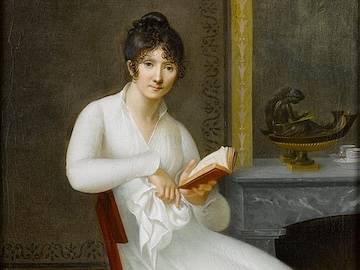Continued from
Part 1
“‘I believe you equal to every important exertion and to every domestic forbearance so long as — if I may be allowed the expression — so long as you have an object; I mean while the woman you love lives, and lives for you. All the privilege I claim for my own sex (it is not a very enviable one, you need not court it)* is that of loving longest when existence or when hope is gone.’ She could not immediately have uttered another sentence - her heart was too full, her breath too much oppressed.”
Dear Anne Elliot! — sweet, impulsive, womanly, tender-hearted — one can almost hear her voice, pleading the cause of all true women. Jane Austen had reached the very end of her life when she wrote thus. Her words seem to ring in our ears after they have been spoken. Anne Elliot must have been Jane Austen herself, speaking for the last time. There is something so true, so gentle about her, that it is impossible not to love her. She is the bright-eyed heroine of the earlier novels, matured, chastened, cultivated, to whom fidelity has brought only greater depth and sweetness instead of bitterness and pain.
By
Anne Thackeray
1837-1919
Abridged.
Questions for Critics
1. What is the author
aiming to achieve in writing this?
2. Note any words, devices or turns of phrase that
strike you. How do they help the author communicate her
ideas more effectively?
3. What impression does this passage make on you?
How might you put that impression into words?
Based on The English Critic (1939)
by NL Clay, drawing on The New Criticism: A Lecture Delivered at
Columbia University, March 9, 1910, by J. E. Spingarn,
Professor of Comparative Literature in Columbia University,
USA.
Précis
Quoting Anne Elliot’s debate with Captain Harville, Thackeray recalled her argument: that a woman, unlike a man, remains faithful in love even when love is unrequited. The sincerity and gentleness with which Anne spoke touched Thackeray, and led her to believe that she was speaking for Austen herself, in this her last novel.
(53 / 60 words)
Quoting Anne Elliot’s debate with Captain Harville, Thackeray recalled her argument: that a woman, unlike a man, remains faithful in love even when love is unrequited. The sincerity and gentleness with which Anne spoke touched Thackeray, and led her to believe that she was speaking for Austen herself, in this her last novel.
Edit
|
Reset
Variations:
1.increase the length of this precis to exactly 60 words.
2.reduce the length of this precis to exactly 50 words.
3.introduce one of the following words into the precis: although, besides, if, just, otherwise, ought, whether, who.
Archive
Word Games
Suggest answers to this question. See
if you can limit one answer to exactly
seven words.
Variations:
1.expand your answer to exactly fourteen words.
2.expand your answer further, to exactly twenty-one words.
3.include one of the following words in your answer: if, but, despite, because, (al)though, unless.
Express the ideas below in a single
sentence, using different words as much as possible.
Do not be satisfied with the first answer you
think of; think of several, and choose the best.
For each group of words, compose a sentence that uses all three. You can use any form of the word: for example, cat → cats, go → went, or quick → quickly, though neigh → neighbour is stretching it a bit.
This exercise uses words found in the accompanying passage.
1
Life.
Plead.
Stamp.
2
Depth.
Deserve.
Excuse.
3
Allow.
Gay.
Speak.
Variations:
1.
include direct and indirect speech
2.
include one or more of these words: although, because, despite, either/or, if, unless, until, when, whether, which, who
3.
use negatives (not, isn’t, neither/nor, never, nobody etc.)
Make words by adding vowels to each group of consonants below. You may add as many vowels as you like before, between or after the consonants, but you may not add any consonants or change the order of those you have been given. See if you can beat our target of common words.
hm
(5+2)
See Words
ham.
hem.
him.
home.
hum.
ahem.
ohm.
Post Box
: Help Available
You are welcome to share your creativity with me,
or ask for help with any of the
exercises on Clay Lane. Write to me at this address:
nicholas@claylane.uk
See more at Post Box.
If you like what I’m doing here on Clay Lane,
from time to time you could
buy me a coffee.
Buy Me a
Coffee is a crowdfunding website, used by over a million people. It is designed
to help content creators like me make a living from their work. ‘Buy Me a
Coffee’ prides itself on its security, and
there is no need to register.

Related Posts
A World of Differences
By
Jane Austen
Emma tries to reconcile her father to the unaccountable tastes of his nearest and dearest.
Read
Picture: Via Wikimedia Commons. Licence: Pubic domain..
Source.
Posted
August 1 2017
A Proper Education
By
Jane Austen
Harriet Smith’s school gave her a grounding in good sense that even Emma Woodhouse could not quite overthrow.
Read
Picture: By Elias Martin (1739-1818), via Wikimedia Commons. Licence: Public domain..
Source.
Posted
July 3 2016
A Tempting Offer
By
Jane Austen
True moral integrity comes from within.
Read
Picture: © Ashley Dace, Geograph. Licence: CC-BY-SA 2.0..
Source.
Posted
May 13 2016
Practice Makes Perfect
By
Jane Austen
Making friends is, like playing music, not just a matter of natural talent.
Read
Picture: © David Dixon, Geograph. Licence: CC-BY-SA 2.0..
Source.
Posted
April 30 2016






